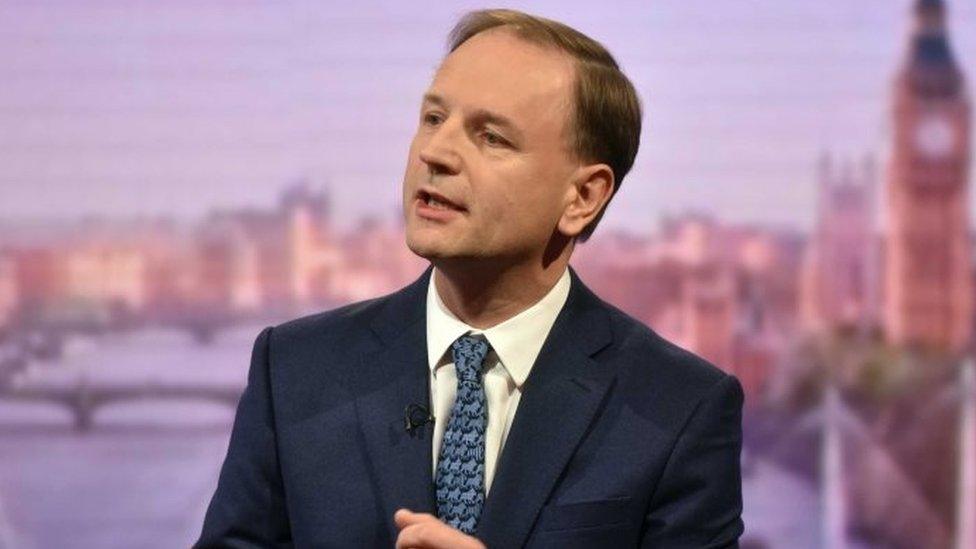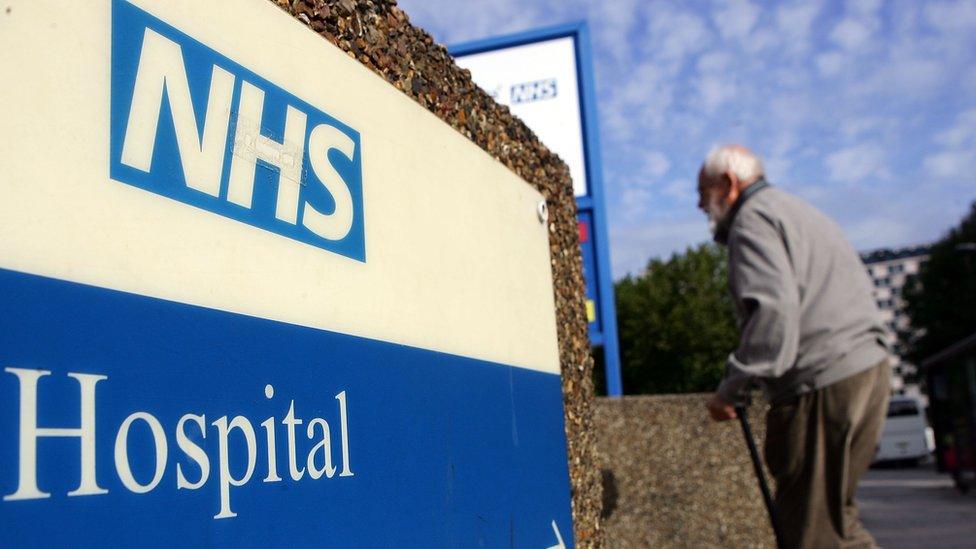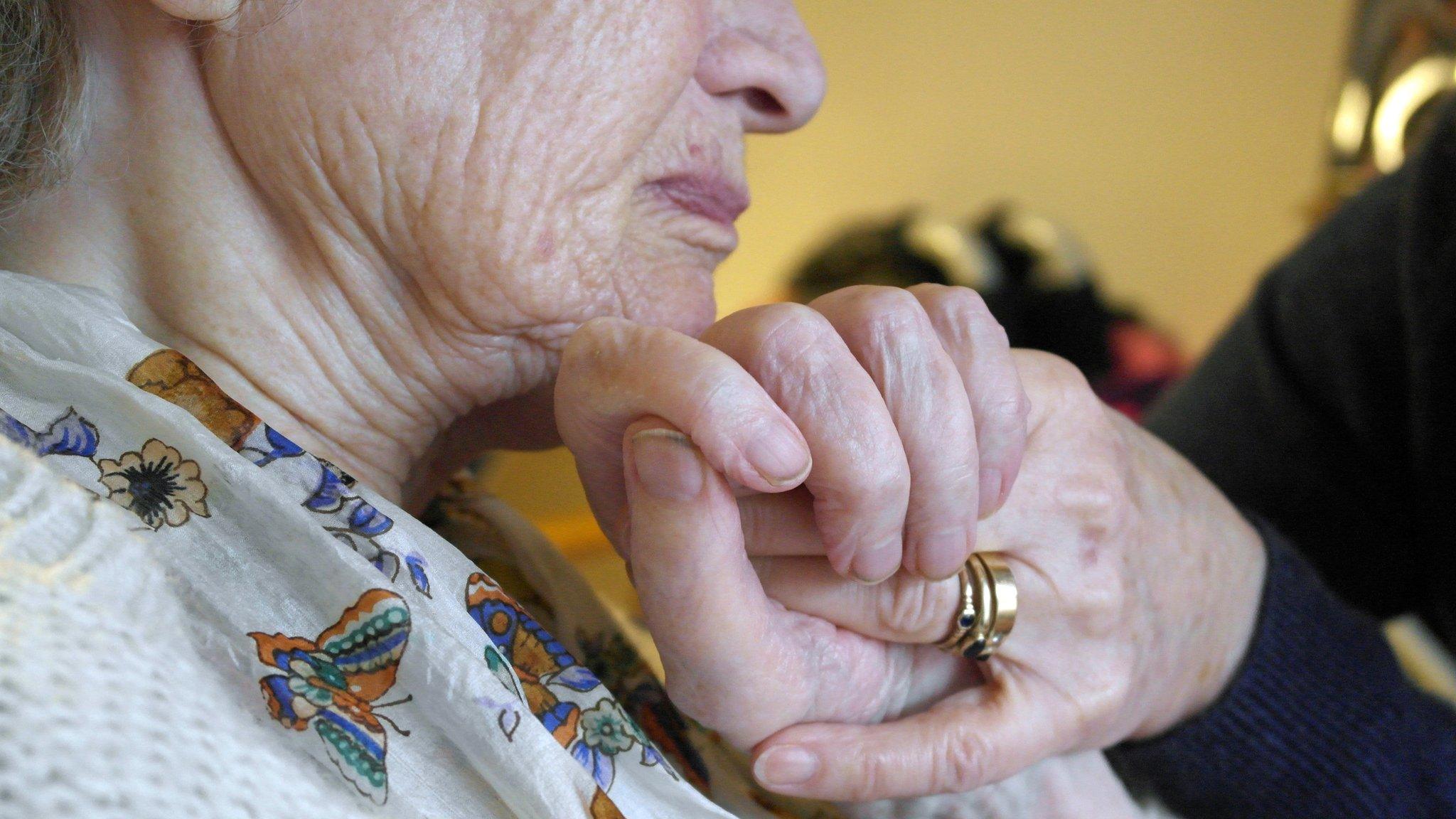Six things to look out for in health in 2019
- Published
The NHS celebrated its 70th anniversary with tea parties, special church services and a "bumper" funding rise.
But while those celebrations may be remembered fondly by those working in the health service as 2018 comes to an end, the storm clouds are gathering as the new year approaches.
What does 2019 hold for the NHS and wider health agenda?
The man with the plan

When the government announced its £20bn-a-year funding rise for the health service, ministers also asked NHS England chief executive Simon Stevens to come up with a 10-year plan to make sure the money was spent wisely.
He has been gathering together a team of senior doctors, nurses and managers to draw up proposals across 20 different work streams.
As well as having shiny new announcements - including a new cancer strategy - the government is understood to want a commitment from the NHS to start hitting its waiting-time targets again.
The key ones for cancer, A&E and routine operations are all being missed.
It means the plan is likely to be released in two stages. The new announcements and broad vision will come first - probably in the first weeks of January, Brexit permitting, with a more detailed planning document to follow.
Blitz on sweet treats

In the spring, Public Health England is expected to provide an update on how industry is doing in reducing sugar in some of the most popular foods.
It will mark the two-year stage of a five-year drive to cut sugar by 20% in a range of products from cakes and confectionery to yoghurts and cereals.
The scheme is voluntary, but industry has been warned that if it does not respond suitably, the government will be prepared to regulate.
At the one-year mark, progress was slow in a number of areas.
Dame Sally Davies, chief medical officer for England, is already on record saying she is not convinced by the approach yet.
She wants to see more taxes on food high in salt and sugar.
The government is also considering regulation on advertising and promotions - plans are expected to be published in the first half of the year.
A 'very green' Green Paper on social care

The government has long been promising to reform the social care system in England.
This is the care provided to older people in care homes and their own homes for daily tasks, such as washing, dressing and eating. It also covers care provided to younger adults with disabilities.
You may remember Theresa May had a stab at outlining her thinking during the election campaign, only to backtrack when her proposals were dubbed a "dementia tax" and started playing badly on the campaign trail.
At the time, new plans were promised by the summer of 2018. That then became the autumn - before an announcement in December that they would be published in 2019.
There have even been suggestions that reform has been put on the backburner indefinitely - although Health Secretary Matt Hancock has taken to Twitter to dismiss those.
But even if the green paper does see the light of day, those involved in drawing it up have been trying to manage expectations.
Kate Barber, a former Bank of England monetary policy committee member who is part of the independent panel advising the government on the green paper, has said it is likely to "disappoint" those who want more.
She said it was unlikely there would be any move towards free personal care, as ministers feared how the implications of that would be received politically. The problem? "It would not come cheap," she said.
The lack of radical reform and concrete plans means it is being called a "very green" Green Paper.
Will the rest of the UK diverge further?

Health policy is devolved. It has meant that, over the past two decades, four separate health systems have essentially emerged in the four nations that make up the UK.
For example, Wales has not placed as great an emphasis on waiting times as England, but has arguably shown more interest in investing in public health.
New mothers get four more contacts from health visitors than they do in England.
Meanwhile, Scotland is held up as the champion of integration between social care and the NHS.
Budgets with councils are pooled and free personal care provided to older residents.
The extra £20bn for England by 2023 means the Treasury will also be making about £4bn available for Scotland, Wales and Northern Ireland combined.
Each nation is busy making plans about how to use that - although Northern Ireland is somewhat hamstrung by the fact that its Assembly is currently suspended.
A long-overdue digital revolution

Matt Hancock became England's health secretary last summer. He took over from Jeremy Hunt, who had become the longest-running health secretary in the history of the NHS.
The introduction of new blood immediately focuses attention on what might be done differently.
Mr Hancock is a fan of digital technologies - he was the first MP to launch his own app.
He has wasted no time in identifying outdated tech in the NHS as an Achilles heel for the health service.
He has already banned the NHS from buying any more fax machines - the health service is said to be the biggest purchaser of fax machines in the world with nine in 10 hospitals still reliant on them.
Meanwhile, he has announced that a number of areas are going to be piloting new apps to allow people to book GP appointments, order repeat prescriptions and access 111 for urgent medical queries.
In an era when people do their shopping, book their holidays and socialise online, many believe it is about time the NHS caught up.
But the past 20 years is littered with failed attempts to revolutionise IT systems.
How Mr Hancock attempts to push forward with this agenda will be watched with great interest.
And what about Brexit?

Like all sectors, health is affected by the decision to leave the EU.
If there is a no-deal Brexit, concerns have been raised that there will be a disruption in the supply of medicines to the UK.
The government has asked drug companies to start stockpiling a six-week supply of drugs and has ordered the purchasing of large fridges to store some of them.
There is also concern that the UK will lose its position as one of the centres of excellence for medical research as collaboration with European colleagues becomes more difficult.
And regardless of what sort of Brexit we get, NHS bosses are concerned about the impact on the workforce.
There is already an acute shortage of staff - and with one in 20 staff coming from other EU countries the fear is this could get worse.
This is despite the government's assurances that the "settled status" policy, which allows those already here to remain, and a new visa system for skilled migrants will mean the UK has the workers it needs.
- Published8 February 2017

- Published8 February 2017

- Published6 January 2017

- Published12 December 2016

- Published13 September 2016
